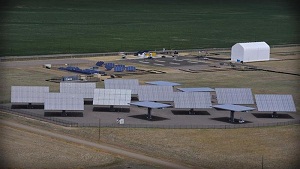Colorado a leading state for solar innovation
 On Oct. 6, representatives from Metro Denver Economic Development Corp (EDC), SolarTAC and Nokero came together to discuss why Colorado is a hotbed for solar innovations and how the state is prepared for more.
On Oct. 6, representatives from Metro Denver Economic Development Corp (EDC), SolarTAC and Nokero came together to discuss why Colorado is a hotbed for solar innovations and how the state is prepared for more.
The organizations held a webcast discussing the clean energy sector in the state, including some of the leading companies with or interested in locating facilities in the state. Companies like SMA Solar Technology, a leading inverter manufacturer, which located its first manufacturing facility outside Germany in Denver. And General Electric, which has expressed interest in locating in Colorado what may by the largest photovoltaic manufacturing plant in the U.S.
“Colorado is a perfect climate for solar, and it is because of the natural resources that are here. You'll hear the term ‘300 days of sunshine.’ We have abundant sunshine in Colorado,” said Janet Fritz, director of technology with the EDC, which runs Colorado Cleantech, a solar resource website. “We have a strategic location in the center of the nation, which makes it a great location to serve the growing North American clean energy markets.”
Colorado also is a hotbed of solar research and testing, according to Fritz. The state has among other things, the National Renewable Energy Laboratory. But it also has SolarTAC (Solar Technology Acceleration Center), which is the world’s largest solar testing facility, with nearly 75 acres of tests ongoing or under construction, and 200 more acres of testbeds being purchased.
“With the village that's been built here in Colorado over the last few years—and the universities that have this renewable energy focus, the national lab, NREL, and a number of new manufacturing organizations and SolarTAC, we can really be that outdoor large-scale, utility-scale testing demonstration center that sort of completes the machine, so to speak,” said SolarTAC Executive Director Dustin Smith.
“SolarTAC allows our members to do both the proprietary as well as the collaborative research necessary to drive business as well as the industry itself,” Smith said. “What our members have recognized is that not only do you have to have good products, the market itself has to be strong. And the only way that you have a strong market is by having a cluster like this where people are working together to continue to refine and develop the market itself.”
Legislation enacted by former Governor Bill Ritter and current Governor John Hickenlooper, both Democrats, has helped foster the industry’s growth in the state.
“BIll Ritter, he really propelled the state forward. During his term in office he signed 57 pieces of legislation including the renewable energy standard to expand and create new jobs in clean energy in our state,” Fritz said. “More recently, Hickenlooper signed a key piece of legislation this year for the solar industry. That was the fair permit act.”
The act reduces the cost of permits for solar.
“It has basically significantly cut the costs of permits to install solar systems both on the residential and commercial side,” she said.
The state’s leading research universities are also working to innovate in the clean energy sector, offering a potential wellspring of young researchers and scientists prepared to work in the solar sector.
“This partnership is working to develop the energy projects and technologies to basically support economic growth in our state with renewable energy industries and basically expand this cluster and then to educate researchers, technicians and the workforce for jobs in new energy economy,” Fritz said.
Image courtesy of SolarTAC.



